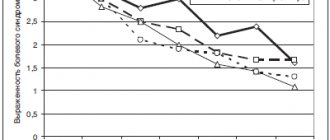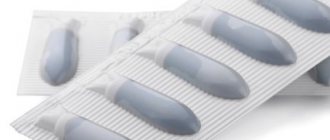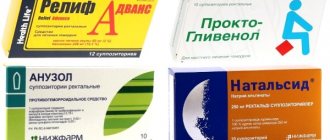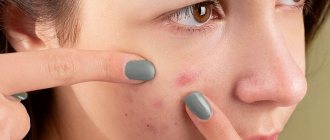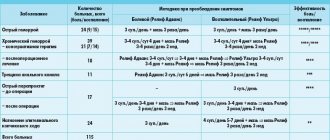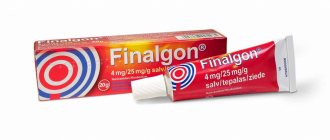CLINICAL DATA
4.1. Indications for use
The drug Relief Ultra is indicated for use in adults over 18 years of age for the treatment of external and internal hemorrhoids, fissures and erosions of the anus, proctitis, anal itching, eczema, and dermatitis of the perianal area.
4.2. Dosage regimen and method of administration
Dosage regimen
Introduce 1 suppository into the rectum in the morning, at night and after each bowel movement up to 4 times a day for 7 days.
Children
The safety and effectiveness of Relief Ultra in children under 18 years of age have not been established.
Mode of application
Rectally. The drug should be used after hygiene procedures.
4.3. Contraindications
- hypersensitivity to hydrocortisone and/or zinc sulfate or to any of the excipients listed in section 6.1.;
- the presence of bacterial, fungal, viral infection in the anorectal area;
- neoplasms of the anorectal region;
- tuberculosis;
- Itsenko-Cushing syndrome;
- severe forms of diabetes mellitus;
- hypernatremia;
- abscess;
- intestinal obstruction, symptoms of intestinal perforation, peritonitis, intestinal fistulas (including multiple), intestinal anastomoses.
4.4. Special instructions and precautions for use
Rectal corticosteroid therapy should be used with caution and only after an adequate proctological examination due to the risk of intestinal perforation.
In severe forms of hypertension, heart rhythm disturbances, immunodeficiency states, osteoporosis, diabetes mellitus and other endocrine pathologies, the use of the drug is permissible only for strict medical reasons, if the expected therapeutic effect exceeds the potential risk of side effects or complications of the underlying disease.
The excipients methyl parahydroxybenzoate and propyl parahydroxybenzoate can cause allergic reactions (including delayed reactions).
If after 7 days of therapy there is no improvement or symptoms worsen, or new symptoms appear, you should consult your doctor.
Do not exceed the recommended daily dose unless prescribed by a doctor.
If an infection develops in the area where the drug is used, you should stop using it and consult a doctor.
4.5. Interaction with other medicinal products and other types of interactions
When used in combination with other steroid-containing medications (both topical and oral), the potential for systemic effects may increase.
Concomitant use of the drug and CYP3A inhibitors may increase the risk of systemic side effects. The combination of these drugs should be avoided unless the expected benefits of therapy outweigh the increased risk of systemic corticosteroid side effects. Patients should be monitored appropriately.
Caution should be exercised when using anticoagulants, oral hypoglycemic drugs, barbiturates, diuretics, and cardiac glycosides simultaneously. If you are using the above or other medications (including over-the-counter medications), consult your doctor before using Relief Ultra.
4.6. Fertility, pregnancy and lactation
The use of the drug during pregnancy and breastfeeding is contraindicated.
4.7. Impact on the ability to drive vehicles and operate machinery
The use of the drug does not affect the ability to perform potentially hazardous activities that require increased concentration and speed of psychomotor reactions (driving vehicles, working with moving mechanisms, working as a dispatcher, operator).
4.8. Adverse reactions
Summary of Adverse Reactions
Adverse reactions are listed by system-organ class, indicating frequency according to the following classification: very often (≥1/10), often (≥1/100, <1/10), infrequently (≥1/1000, <1/100), rare (≥1/10000, <1/1000), very rare (<1/10000), frequency unknown (cannot be estimated based on available data).
Immune system disorders
Frequency unknown: allergic reactions (allergic contact dermatitis, flushing, itching).
General disorders and reactions at the injection site
Frequency unknown: irritation, soreness, change in skin color at the site of application, dryness and swelling of the mucous membrane, rectal bleeding.
Reports of suspected adverse reactions
It is important to report suspected adverse reactions after drug registration to ensure continuous monitoring of the benefit-risk ratio of the drug. Healthcare professionals are encouraged to report any suspected adverse drug reactions through the national adverse reaction reporting systems of the member states of the Eurasian Economic Union.
Russian Federation
109012, Moscow, Slavyanskaya square, 4, building 1
Federal Service for Surveillance in Healthcare (Roszdravnadzor)
Phone: +7-495-698-45-38, +7-499-578-02-30
Fax: +7-495-698-15-73
https://roszdravnadzor.gov.ru/
The Republic of Kazakhstan
010000, Nur-Sultan, st. A. Imanova, 13
“National Center for Expertise of Medicines and Medical Devices” of the Committee for Medical and Pharmaceutical Control of the Ministry of Health of the Republic of Kazakhstan
Telephone
https://www.ndda.kz
Republic of Belarus
220045, Minsk, Dzerzhinsky Ave., 83, building 15, 8th floor
Republican Unitary Enterprise “Center for Expertise and Testing in Healthcare”, Republican Clinical Pharmacological Laboratory
Phone: +375-17-242-00-29
https://www.rceth.by
Republic of Kyrgyzstan
720044, Bishkek, st. 3rd Line, 25
Department of Medicines and Medical Devices under the Ministry of Health of the Kyrgyz Republic
Phone-95
Fax-08
https://pharm.kg
Republic of Armenia
0051, Yerevan, Komitas Ave., 49/4
“Scientific Center for Expertise of Medicines and Medical Technologies named after. Academician E. Gabrielyan JSC
Phone: (+374 10) 23-16-82; Hotline (+374 10) 20-05-05;
Fax: (+374 10) 23-21-18
https://pharm.am
4.9. Overdose
Symptoms
Cases of drug overdose with disorders of the vital functions of the body have not been described in medical practice. It is assumed that long-term use in large doses can lead to the same consequences as the systemic use of excessive doses of corticosteroids: hyperglycemia, hypernatremia, Cushing's syndrome, immunosuppression, erosions and ulcers of the gastrointestinal tract, osteoporosis, etc.
Treatment
In these cases, drug withdrawal and conventional detoxification and symptomatic therapy are recommended.
Peculiarities
Relief suppositories, reviews of which indicate their high effectiveness, belong to the group of drugs used to treat hemorrhoids. Today they are represented by several types of suppositories. Suppositories differ in composition, but all have a pronounced anti-inflammatory, healing and analgesic effect. This allows you to quickly relieve unpleasant symptoms of the disease.
Relief candles are produced in a torpedo shape, which simplifies their use. Suppositories may be white or have a slightly yellowish tint. Since different drugs contain different basic and additional substances, this makes it possible to ensure the effectiveness of the drug in different cases.
PHARMACOLOGICAL PROPERTIES
Pharmacotherapeutic group: antihemorrhoidal agent
ATX code: C05AA01
5.1. Pharmacodynamic properties
Mechanism of action, pharmacodynamic effects
Hydrocortisone acetate is a steroid hormone of the adrenal cortex; when applied topically, it has anti-inflammatory, desensitizing, antiallergic, vasoconstrictor and antipruritic effects. Inhibits the release of inflammatory mediators.
Zinc sulfate – promotes the healing of wounds and erosions.
Types of suppositories
Today, pharmacies offer 4 types of relief suppositories. When choosing a remedy, you should take into account the symptoms of the disease. It should be understood that successful treatment of hemorrhoids is only possible with an individual approach.
The most commonly prescribed treatment for internal hemorrhoids is classic relief. The components in its composition allow you to quickly stop bleeding and swelling. The main active substance in the classic drug is phenylephrine hydrochloride. It refers to adrenergic stimulants. The component has a local vasoconstrictor effect and improves blood circulation in hemorrhoids. Against this background, the release of exudate decreases and swelling is relieved. Thanks to the cocoa butter content, it has a pronounced softening effect. Due to its mild effect, classic relief is indicated for preventive purposes to prevent exacerbation of the disease. The drug has minimal side effects and can be used for a long time.
Other types of medicinal suppositories:
- Relief Advance. This remedy has a strong analgesic effect. The main active ingredient in the drug is benzocaine, which is a strong anesthetic. Suppositories are recommended for use in the acute stage of the disease, strangulation of the node, as well as after operations or during painful diagnostic procedures. The drug has a number of serious contraindications and can cause negative reactions in the body, so it should only be used if recommended by a doctor.
- Relief Ultra. The active ingredients in the product are zinc sulfate and hydrocortisone acetate. This combination provides a strong anti-inflammatory effect and allows you to quickly relieve itching. The product is an emergency aid for anal fissures. In the postoperative period, suppositories help prevent the development of the inflammatory process. It is allowed to use the product in short courses - up to 7 days. It is important to exclude the presence of contraindications before use.
- Relief Pro. The drug contains fluocortolone pivalate. This substance blocks the production of inflammatory mediators. The pronounced analgesic effect of suppositories is provided by lidocaine. The product is recommended for chronic pathologies that are accompanied by constant pain and inflammation. Due to the large number of side effects, the drug can only be used if indicated and recommended by a doctor.
Contraindications and negative reactions
A contraindication to the use of relief candles is individual intolerance to any components in their composition. Due to the fact that the products contain different substances, it is necessary to read the instructions for use before carrying out treatment.
Relief suppositories are contraindicated for thromboembolism and granulocytopenia. Treatment with elevated sugar levels should be carried out with extreme caution. Conditional contraindications include hypertension, hyperthyroidism, pathologies of the cardiovascular system, and hepatitis. It is not advisable to use relief suppositories during pregnancy and lactation. Suppositories are prescribed only after reaching the age of 12 years.
If contraindications are excluded and the doctor’s recommendations are followed, negative reactions of the body are rarely observed. Sometimes allergic reactions, increased blood pressure and increased heart rate occur. In such cases, you should stop using suppositories and consult a doctor.
Do not use relief candles if the packaging is damaged. This poses a risk of infection. Also, you should not use expired product.
